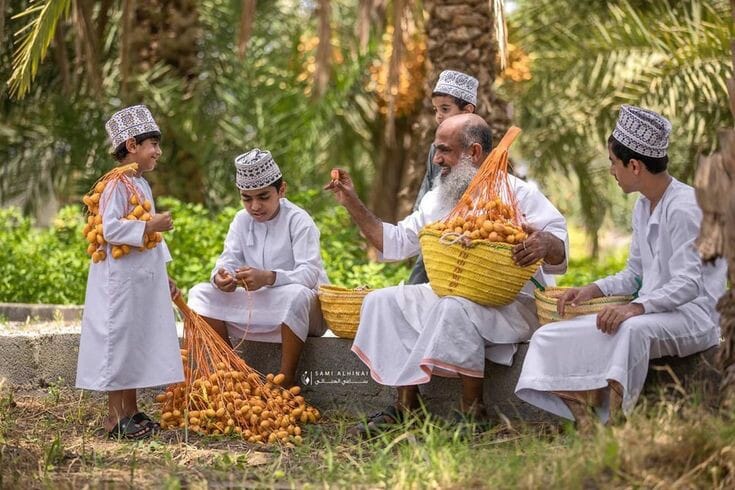
Production and Cultivation Area Tunisia has approximately 5.4 million date palm trees, of which about 3.55 million are of the Deglet Nour variety. Dates are cultivated in the southern regions of Tunisia across four governorates: Kébili, Tozeur, Gabes, and Gafsa. The total cultivation area in these regions spans around 41,000 hectares.
Between 2007 and 2011, about 60-65% of these palm groves were either newly planted or rehabilitated. Key factors behind this development include:
- Expansion of irrigation across 20,000 hectares as part of Tunisia's Eleventh National Agricultural Development Plan (2007–2011).
- Financial incentives offered to the private sector.
In prior years, challenges such as limited access to resources like water and land, rising input costs, reduced government investments in agriculture, and political instability significantly slowed the growth of production and cultivation areas. To address these issues, Tunisia's Twelfth National Agricultural Development Plan (2011–2014) emphasized improving productivity in existing palm groves.
Key achievements of these programs include:
- Upgrading Deglet Nour palm groves in the Kébili and Tozeur regions.
- Increasing the production of organic dates to boost exports.
Approximately 60,000 farmers depend on date cultivation for their livelihood. Unlike other agricultural products in Tunisia, dates—alongside citrus fruits and tomatoes—are significant export commodities. Dates account for 5% of Tunisia's agricultural production, with the sector involving around 60 independent exporters.
Date Varieties
The dominant variety in Tunisia is Deglet Nour, accounting for 75% of the country's total production. This variety is known for its excellent storage capabilities and strong marketability throughout the year. Deglet Nour dates are sold in various forms and packaging styles. Other traditional varieties include:
- Rochdi, Bisr, Kenta, Khouat Alliga, Allig, and Kentichi.
However, cultivation of these varieties is declining due to their lower profitability and limited export demand.
Tunisia is a major supplier of dates to Europe.
Date Collectors
In Tunisia, "date collectors" refer to licensed companies or individuals responsible for gathering dates from all date-producing regions. These collectors play a central role in the value chain, with around 70% of dates passing through them. Most collectors are local traders who purchase dates directly from farmers, often while the fruit is still on the tree. There are approximately 400 collectors in Tunisia.
Typical operations involve purchasing 50 to 300 tons of dates annually, while a few larger collectors handle 1,000 to 2,000 tons per year. These collectors oversee various stages, including harvesting, transportation, and storage. Dates are either sorted initially and stored in cold storage facilities or sold to wholesalers and exporters’ packaging units.
Cold Storage Facilities
Tunisia has 231 cold storage units, with 100 in Tozeur and 131 in Kébili, the two major date-producing regions. Additionally, there are 127 small-scale cold storage units with an average capacity of 120 tons each, primarily used by traders.
The Date Processing and Packaging Industry
The date processing and packaging industry is one of the most important agricultural and food industries in Tunisia. It has created a significant income source for farmers, especially in southern regions.
Historically, most packaged dates in Tunisia were in 1.2 to 5 kg packs. However, with the rise in European exports, companies have introduced smaller packs of 150 to 250 grams to cater to consumer preferences. Packaging is often customized, with some importers even providing packaging materials for Tunisian companies to use.
Modern innovations in packaging include:
- Vacuum packaging
- Controlled-atmosphere packaging
Currently, Tunisia has 75 packaging units with a total capacity of 59,000 tons, though these units typically operate at 50% of their capacity. Production adheres to customer preferences while maintaining product quality and hygiene standards.
The relationship between the value chain stakeholders—producers, collectors, packaging units, and exporters—is based on informal agreements rooted in mutual trust and commitment. Maintaining these relationships is crucial, especially for commercial entities keen on preserving their reputation.
Three types of contractual arrangements are common:
- Farmer - Collector
- Farmer - Exporting Company
- Exporting Company - Collector
Profitability in the packaging sector has improved in recent years due to the establishment of production lines for date syrup and paste. These facilities transform 20-30% of third-grade dates into these value-added products. Companies have also heavily invested in implementing food safety and hygiene standards.
Major Date Processing and Packaging Companies in Tunisia
- Boudjebel S.A. VACPA
- Founded: 1982
- Employees: 1,500
- Farmers Supported: 600
- Capacity: 13,000 tons (including 6,000 tons of organic dates exported)
- Certifications: ISO 9001, ISO 14000, Organic, Fair Trade, Halal, GlobalGAP, SMETA, BRC, JAS, FDA
- Products: Chocolate bars, fancy and regular packaged dates, date sugar, paste, oil, syrup, chips, granules, and puree.
- Horchani Dates
- Employees: 500
- Export: 3,500 tons of dates (including 440 tons of organic dates)
- Features: Modern packaging line, three registered trademarks
- Certifications: ISO 22000 & 9001, USDA Organic, BIO, GAP, BRC, BCS ÖKO-GARANTIE
- Products: Packaged dates, date paste, powder, syrup, and chips.